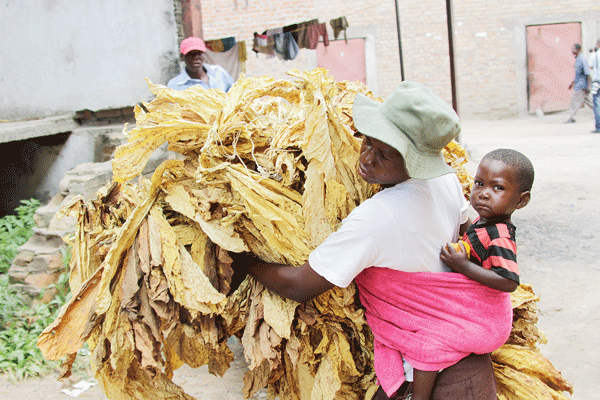
Tobacco farmers have called on government to deal with recurring obstacles that have in the past affected the smooth selling of the golden leaf.
BY FIDELITY MHLANGA
Farmers always complain of getting a raw deal despite being the proverbial goose that lays the golden eggs as they generate the much-needed foreign currency. The concerns came ahead of the opening of the 2018 tobacco marketing season on March 21.
Each marketing season, farmers are left stranded with authorities seemingly not forthcoming to address their plight.
Federation for Farmers’ Union chairman Wonder Chabikwa said there was need to carefully handle tobacco farmers’ welfare as they facilitate the inflow of forex into the country.
“Every year we have a problem of farmers crying. We must be responsible and make sure we handle carefully the hen that lays the golden eggs.
“The bulk of the farmers are small-scale and must be given preferential treatment,” he said, adding the $1 000 cash allocation per first sale, which was adopted last season, was ideal.
“Once that is sorted, we will weed out the cash barons at the tobacco auction floors because they put farmers in a trap as they need cash to pay for labour,” Chabikwa added.
- Chamisa under fire over US$120K donation
- Mavhunga puts DeMbare into Chibuku quarterfinals
- Pension funds bet on Cabora Bassa oilfields
- Councils defy govt fire tender directive
Keep Reading
Last season the Reserve Bank of Zimbabwe (RBZ) announced that farmers would be initially paid $1 000 and the rest deposited in bank accounts.
That never happened, leaving farmers at the mercy of cash barons and unscrupulous traders who took advantage of the chaos by buying tobacco in cash at lower prices than those prevailing on the auction floors.
Last week, RBZ governor John Mangudya said growers would be paid $300 per day through banks stationed at auction floors upon presentation of sales statements. He said the balance would be transferred into growers’ bank accounts.
Economist John Robertson said the country’s cash situation had remained dire despite the repatriation of the externalised $250 million, signalling a tough season for tobacco farmers.
“It is very difficult to understand that the cash situation in the country has not improved in the past three months,” he said.
“This is despite government telling us that $250 million has been returned into the country.
“The problem of cash extends much further than tobacco. We have seen the problem extending to gold as well, with illegal buyers getting gold from miners because there is no sufficient cash at Fidelity Printers and Refiners.”
Zimbabwe Tobacco Association CEO Rodney Ambrose said small-scale farmers should be prioritised as they had not embraced plastic money.
“Many small-scale farmers are yet to embrace complete financial inclusion; it is a seasonal process,” he said.
“Therefore, farmers should once again be prioritised in their requirements for cash-based costs and foreign currency allocation for critical inputs and capital expenditure, the latter of which the RBZ has pledged to do this season.”
Economist Clemence Machadu said rural areas where most tobacco is grown were deprived of banking infrastructure, hence the need for cash.
“Most of the farmers live in areas where there is little to no banking infrastructure, poor network access and no electricity, which makes cash king to them,” he said. “They also employ people who do not have bank accounts or mobile money platforms. To some extent, their cash requirements are therefore justified.
“But I think tobacco farmers need to be more exposed to financial inclusion and there should be deliberate action taken in that regard by authorities.”
Machadu it was essential for authorities to decisively deal with bogus buyers to bring sanity to the tobacco selling procedure.
The Tobacco Industry and Marketing Board (TIMB) said it was geared to stem the problem of bogus buyers this season as it had been conducting training and awareness programmes for farmers.
TIMB said it had put in place stringent crowd control measures at the selling points and was working closely with the Zimbabwe Republic Police and the President’s Office.











